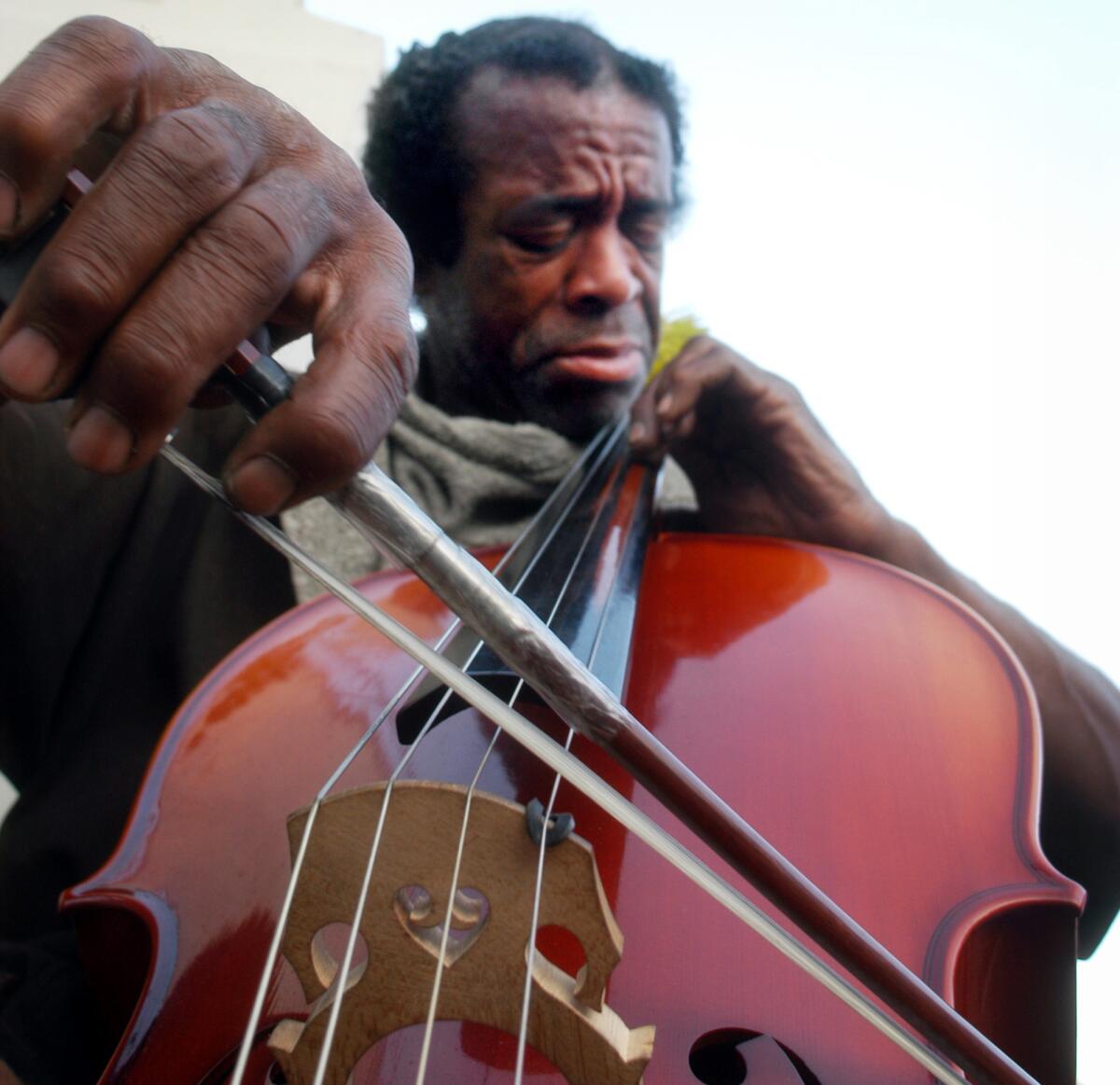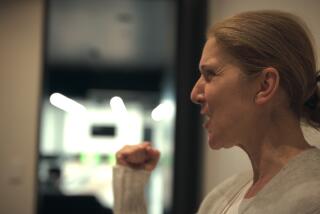A Cello Backdrop for Voices Inside

When I saw Nathaniel Anthony Ayers back in his usual location, I had to ask: How could he stand playing a crummy violin when he had a brand new cello waiting for him several blocks away?
Nathaniel lowered his eyes. He was dying to play that cello again, he admitted. But not if he had to trudge through the heart of skid row in downtown Los Angeles and play it at a drop-in center for the homeless and mentally ill.
He wondered if I would go get the cello and bring it back to 2nd and Hill. Thatâs his spot, he told me, just like the L.A. Times building is my spot. Second and Hill is where I had first seen Nathaniel playing a violin with two missing strings, and itâs where Nathaniel had first played the cello that was donated by a reader.
I told Nathaniel Iâd love to go get the cello and bring it back, but I didnât think it was a good idea to lug a valuable instrument through the streets. Someone could mug him and run off with it.
I didnât let on that I also hoped heâd make a connection at Lamp Community, which treats the mentally ill. At some point, Lamp counselors say, Nathaniel could be a candidate for an apartment in their independent-living program.
âI looked through the door to the courtyard,â Nathaniel said of Lamp, âand I saw one of the biggest purse snatchers who ever worked this city.â He also saw people smoking, and he canât stand cigarettes.
Nathaniel promised heâd go back sooner or later, but I had my doubts.
Be patient, the Lamp staff told me. It could be weeks, months, or years. These things canât be rushed, especially in the case of someone who enjoys his solitude as much as Nathaniel does.
A few days later, I got an early-morning phone call.
âI have some good news,â said Shannon Murray, a Lamp director. âNathaniel is in the courtyard, playing his cello.â His impromptu concert was still in full swing when I arrived. Nathaniel, diagnosed with schizophrenia 30 years go, looked a little more ill-at-ease than usual, but he was OK with the compromise for the moment. The onetime phenom, who grew up in Cleveland and went to New Yorkâs famed Juilliard School on a scholarship, had an audience of a dozen homeless and mentally ill clients, about half of whom were paying attention.
âHe canât play,â sniffed one critic.
A woman seated at a table fell asleep while eating a piece of chicken, her head resting near her lunch. A young gent with short-cropped hair marched into the courtyard and barked in an angry voice: âYeah, like this family can ever have a sensible conversation.â Nathaniel played for hours, searching for fragments of the Schubert and Dvorak pieces he studied so many years ago. He didnât even look up when a social worker announced: âAnger management. Anybody here want to go to anger management?â
Patricia Lopez, another Lamp director, said she wished I had caught an earlier conversation between Nathaniel and Carol, an elderly resident of the shelter. Carol, diagnosed 40 years ago with schizophrenia, had approached Nathaniel to say she had read all about him in The Times.
âHe told her his expertise was music, and she told him her expertise was salvage,â Lopez said. âThey sat down and talked for about half an hour.â By the time I caught up with Carol, Nathanielâs concert was drawing to a close. He was itching to get back on the street.
âIt was a big treat to have him playing here,â Carol said. With her coiffed white hair, neat clothes and angelic smile, she looked like she got lost on her way to Sunday Mass and decided to take up residence on skid row.
I asked about her salvaging operation, and Carol went into great detail.
She walks through downtown, she said, collecting plastic bottles and aluminum cans and taking them to recycling centers. As I listened to her lecture on waste, I wondered if on some level she was offering a commentary on the way society discards the mentally ill.
âThe world wastes too much,â Carol said, and too many people are out of work. She insisted she can attack both problems by opening a large-scale salvage operation, and she is undeterred by the small matter of being in her mid-70s and living in a shelter for the mentally ill.
âIâve got to dream,â she said.
Her plan is both rational and delusional, an echo of the inspired madness I often get from Nathaniel. Iâve been working toward the day when I can talk to Nathaniel about his condition, but Carol seemed instantly comfortable describing the landscape of a schizophrenic mind.
It hit when she was about 37, Carol said. She was a Highland Park homemaker with an interest in horticulture, and she and her husband -- a floral designer -- had two children.
âThatâs when I had my breakdown,â she said.
Was she aware of it at the time?
âOh my, yes. I was running away from my family for days at a time.â She didnât know why, or where she was going. But she slept on the street and in neighborsâ yards while her family searched frantically for her. Eventually, she landed in a mental hospital, where her first instinct was to pick a fight with the biggest woman on the ward.
âShe was about 6 feet tall,â Carol said.
When I asked why she would do such a thing, she paused before answering.
âIâm different,â she said. âIâll admit to a lot of anger in me. And paranoia too. Itâs not so much fear as it is suspicion.â She said she didnât want to talk about it, but she thinks her late husband might have been trying to poison her. The family television set couldnât be trusted, either.
âI was getting messages from the TV.â
What kind of messages?
âThatâs personal, Steve.â She was more comfortable talking about the voices she hears.
âItâs never anything like, âGo kill yourself.â Itâs just someone calling my name. I donât know who it is, but itâs happened four times in the last six months.â No matter how sick she gets, though, Carol claimed she will never go back on medication. The side effects are wretched, she said, and the medicine they gave her in the hospital turned her legs into jelly.
âIt didnât immobilize me, but it would weaken my muscles and lower my blood pressure, so that I would stand up and faint.â Worst of all, she said, the drugs leave her in such a fog, she canât enjoy one of her passions -- reading.
âI really think the medical system is overmedicating people and under-counseling them,â she said. âWe need more talk therapy.â
Carolâs daughter Brynne, who lives in the Highland Park house where her mother went mad, confirmed Carolâs story. Brynne told of her familyâs decades of love, worry and exasperation, with countless searches for Mom in the neighborhood and on skid row, along with multiple visits to psychiatric wards.
âI really feel that I lost a lot as a child,â said Brynne, who is 47 and regularly visits her mother. âI didnât have a mom.â Her motherâs odyssey parallels a history of failed policy, from the shutdown of mental hospitals, to the broken promise of adequate community clinics and halfway houses, to the teeming population of addled street dwellers living in squalor.
âIâve developed so much more compassion for someone on the street, and it frustrates me to death that theyâve taken so much funding away from the mentally ill,â Brynne said.
At Lamp, Brynneâs mother watched as Nathaniel tried to pull a fast one. When no one was looking, he loaded the cello onto his shopping cart and was prepared to wheel the instrument away, breaking his promise. Lamp counselor Raul Gonzalez was on to him, though, and adeptly talked Nathaniel into leaving the cello in the office.
Nathaniel wasnât happy about it. He walked half a block down the street, pulled a tennis ball out of his shopping cart and tossed it against the wall for a while, using his Christmas stocking as a mitt. A few days later, he returned to Lamp, and this time, he managed to sneak the cello out.
I saw him playing it on Friday in his favorite spot, just outside the 2nd Street tunnel.
Donât worry, he told me, a T-shirt wrapped around his head like a turban. He had kept the cello on the street the previous night, and nobody bothered him. He said he had tied the cello to his violin, hid the instruments under a tarp, and slept next to them on the sidewalk near 4th and Los Angeles streets.
He still had every intention, Nathaniel promised, of taking the cello back to Lamp. At some point.
Carol, for one, would like that.
âMy favorite piece is Beethovenâs Sixth,â Carol told Nathaniel on the day of his courtyard concert.
âThe Pastorale,â Nathaniel said, hearing the music and waving a hand as if conducting an orchestra.
I called Nathanielâs sister Jennifer in Atlanta that day from Lamp to describe the scene. Nathaniel brightened when I handed him the phone and he spoke to his sister for the first time in several years.
âIâm very fond of you too,â he told her.
*
Reach the columnist at [email protected] and read previous columns at www.latimes.com/lopez.
More to Read
The biggest entertainment stories
Get our big stories about Hollywood, film, television, music, arts, culture and more right in your inbox as soon as they publish.
You may occasionally receive promotional content from the Los Angeles Times.











